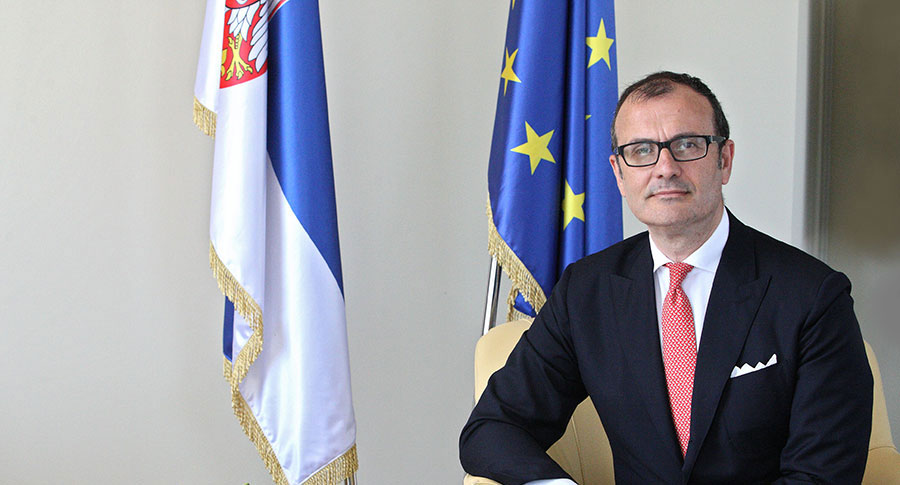In an interview with NIN magazine, Ambassador Sem Fabrizi Head of the EU Delegation to Serbia said that new negotiating chapters would possibly be opened in June. “Your Government submitted numerous documents as evidence of its preparedness for opening of five more chapters. There is the need to have the 28 Member States to be unanimously in agreement,” Fabrizi explains.
Commenting on this year’s Report on Serbia, Fabrizi reminded that it covered the period from October 2016 to February 2018. The analysis of political and economic criteria showed that “progress was made in almost all sectors, in ones, such as the economic, more than in others. Second, it points to those issues where progress is yet to be made, and, most importantly, encourages Serbia to do necessary additional reforms in certain areas. Some of these areas are judiciary, fight against corruption and organized crime, and also freedom of expression,” Fabrizi said.
Asked to comment on the Report’s conclusion that there was no progress in freedom of expression, Fabrizi said that “the core issue is a better environment for media expression. There is the issue of transparency of ownership, then the importance of how money is distributed in the media, and number of other issues about which we have to be as objective as possible so as to create an environment where everyone can express their opinion publicly.“
When asked whether the normalisation of relations with Kosovo is the only thing the EU is interested in – as perceived by a portion of the public – Fabrizi said: “I don’t think this is EU’s only interest. On the contrary, the Report expresses concerns about the judicial system. It says that there is still a lot of space for political influence over the judiciary,” Fabrizi explained, adding that the Government needs to make amendments to the Constitution. He said that the Report examined the issues of corruption, fight against organised crime, freedom of media, money laundering. “Citizens of Serbia can rest assured that the EU is insisting on steps that will make Serbia a country with more democracy, more competitive economy, and a country where human rights are fully respected. Let me also add that all grants from the EU so far, which amount to 1.5 billion euros only in the past 6 years, are for the people of Serbia. Paradoxically to the feeling you are asking me about, Kosovo fitted in less than two pages of this EC Report.“
EU Ambassador said that “the internal dialogue on Kosovo launched by the President is a good initiative that, as it was said at the beginning, also serves the purpose – as it has been said – of ’demythologizing’ Kosovo in the Serbian society. This is obviously a fruitful debate, but since it is an internal dialogue, we are not to interfere or comment its course.”
When asked to share what Maja Gojkovic told him when he laid out objections to the work of the National Assembly, Fabrizi said he conveyed to her one of Report’s messages: “The Parliament is not fulfilling entirely its oversight function over the Executive.” It also recommended that the Parliament should report “more regularly on the work of ministers and review periodical reports submitted by independent bodies. In addition, the previous report noted that too many bills were sent by the Government to the Parliament for urgent adoption, and this number has positively been reduced, though it is still high. We will see how the Parliament will treat these recommendations.“
Asked to comment on the internal EU debate regarding what comes first – new EU enlargement or an internal reform – Fabrizi said that “there is no contradiction; those are parallel processes.“ He reminded that the Strategy for Western Balkans, adopted in February, offered a credible enlargement perspective; just last week the Commission adopted a recommendations package to open negotiations with Albania and the FYROM. “These are very strong signals that the EU is determined about the direction it has taken. Enlargement is back in the EU’s focus,“ Ambassador Fabrizi told NIN in an interview.




